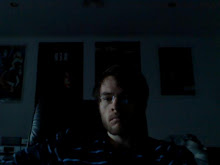Literary criticism, as I have learned from Dr. Johnson, is the art of making the implicit finely explicit —Harold Bloom
& why not criticism tout court?
There's a singersongwriter whose career I follow with rapt interest (I was first a fan of her poems); her second newest song's called 'Swim Thru', & I've been drawn to write about it. Problem is, according to a soon published (in The Owl) essay, I'm supposed to believe 'Song lyrics [...] are not poetry.' How else to write about Laura Hocking's lyrics but in terms of poetry criticism? I know no other discourse well — not even the professionalised discourse of academic writing, for which ignorance I've suffered in college. Pace Ricks, song lyrics are a form on their own: they don't need 'poetic' imprimatur. But if to split music from words in criticism of lyrics is like writing on Picasso colourblind, I'll have to muddle through, missing the interplay of azure & crimson.
The lyric is here; the song is found on the MySpace profile to which the title is linked.
Throughout my analysis I shall want to eschew questions of evaluation. Doubtless I'll fail: by practice if not by theory criticism has, for me, been to show what's good & why. For poet-critics, judgements of value have been the very sinew of the practice, or the 'art' in Bloom's phrase. I'm no poet, but still I find it hard to criticise from outside, to think of myself as professional observer of cultural product, as detached exponent of aesthetic strategies. (Wilson said Shakespeare's 'detachment seems so bafflingly consummate'; what he means is Shakespeare so consummately inhabited his characters you can't see the join.) Criticism without good & bad feels like autopsy when you could be at home fucking your wife.
Sometimes I suspect the endeavour to 'find out' by criticism rather than by scholarly inquiry is wishfully, naïvely scientistic. Just as precarious, the endeavour to make what's good & why finely explicit rests with suspicious idiosyncrasy on the concept of 'taste'. Gah, I'm off-track.
'Swim Thru' works by its transforming metaphor. Hocking makes of the title cliché an iconography whose private meaning may have been tenderly specific, but which is ambiguous enough (& ambiguous perhaps for privacy) to catch, to appear to reflect, the concerns of others. Her fragmented, delicate plot — really a row of vignettes told in hushed vocative — manages to confer on the phrase 'I've seen your swan dive', with its s, n alliteration & rhyming symmetry ('I've'/'-ive'), a moving significance beyond its bare sense. A metaphor, yes, but for what? Surely a crass reduction to say, 'For the means of the person addressed to face challenge'? Paraphrase isn't so much heresy as hazard; the converse approach would be to look at the line & say, 'This embodies love.' For 'swan dive' indeed figures how the person addressed would face challenge, the water he or she must swim through, & that metaphor is metaphor also of the singer's feeling for swimmer: the word 'swan dive' holds potential for beauty as well as for a sort of helpless, headlong clumsiness — as here, 'Mrs. Green executed her swan dive, flopping onto the water with the poise of a stricken bird' (OED). Those senses the metaphor mingles in suggesting the 'I', because of love, has seen grace in what lacked grace. Such motion, such transforming of weakness to fiercely cherished mark of character, embodies the perspective of lover. All her affection is there in two words, but the affection could be anyone's, for any diver.
You might have noticed I fail to mention the line after 'swan dive', 'It suits you just fine.' The reason is I don't like it, I think because it seems filler to support the half-rhyme 'fine' — a little too banal, too vacant where real vacancy would have given richer ambiguity. So I don't like it, but I think I understand it. Recall my phrase 'hushed vocative'. The song has the tone of a loveletter, & stays true to that tone quite rigorously. Thus it's unafraid of cliché, of irrelevance or private reference, of bathos & of self-exposure. The instances of bathos, for example, with which each verse closes, gently sustain the authenticity of that voice. Harking back to the song's inaugurating cliché, their resonance expands like that of the swimmer metaphor as, by muttered promises & lazy musing, they represent to us the tenderness of intimate address, lover to loved. Even the words' aural texture expresses that intimacy: the singer's lexis, moreover her thoughts, often seem determined by vowel play. Where to aim the catapult? Well, we could go to
How subtle is this song! You can tell it's art because the more you look, the more you see.
And o god i heard you
On first listen it sounds as though the singer's calling her 'you' a coward here. Perhaps she is, but the tone is one of tender mockery ('Best look for you'). Again, however, the metaphor transforms. 'open water', in Hocking's iconography, should mean something like 'trouble', 'hardship'. It's what you swim through, where you dive — 'water' being linked vocalically to 'war'. & if the 'you' has resolved never to fight, being called up would indeed make for adversity. But, as with 'swan dive', the metaphor's secrecy opens out further suggestion, so one could read here a teasing scepticism about the strength of 'you's commitment to his abstention. 'You looked so resolute', are the words above; worth quoting fully:
And o god i heard you
The song's most beautiful moment, & impregnable to my criticism. The song's most beautiful moment for how it's sung.
Except: does she want him for his resolution, or for the vulner- ability behind it — for another swan dive seen?
11.5.07
OF Hocking & song
*Thanks to Laura for this point.
Subscribe to:
Post Comments (Atom)




This comment has been removed by the author.
ReplyDelete